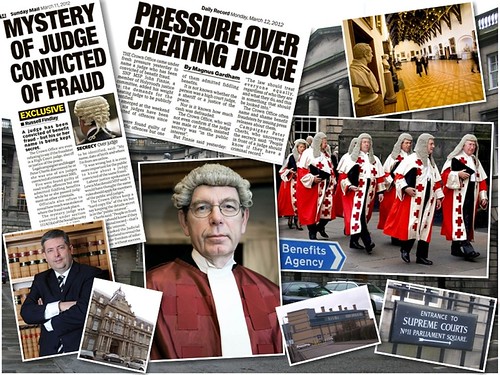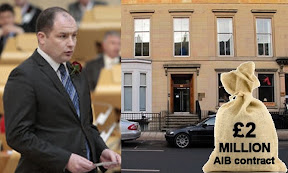 SNP controlled Council inflate town’s legal bill 500% to £15K for Common Good paper shuffling. A SMALL COMMUNITY in the Borders is facing a staggering FIFTEEN THOUSAND POUND demand from the SNP led Scottish Borders Council for administering the town of Selkirk’s Common Good Fund, reveals local media who also report a whopping NINE THOUSAND POUNDS of the bill is for the work of one single lawyer employed by scandal hit Scottish Borders Council. The in-house council lawyer who the £9K legal fees are being attributed to, has been identified by council figures as Anne Isles, a solicitor who has been at Scottish Borders Council for over ten years.
SNP controlled Council inflate town’s legal bill 500% to £15K for Common Good paper shuffling. A SMALL COMMUNITY in the Borders is facing a staggering FIFTEEN THOUSAND POUND demand from the SNP led Scottish Borders Council for administering the town of Selkirk’s Common Good Fund, reveals local media who also report a whopping NINE THOUSAND POUNDS of the bill is for the work of one single lawyer employed by scandal hit Scottish Borders Council. The in-house council lawyer who the £9K legal fees are being attributed to, has been identified by council figures as Anne Isles, a solicitor who has been at Scottish Borders Council for over ten years.
However, Community leaders in Selkirk are demanding a full breakdown of the staggering FIVE HUNDRED PERCENT INCREASE under the new SNP controlled administration, after it emerged the Council had earlier been charging around £3-£4k a year prior to the Scottish Nationalists taking charge of the south of Scotland local authority, which is mired in a £262 Million pound mountain of debt and is regularly featured in financial scandals.
Reports in the local media also highlight the fact the SNP controlled Council is charging the small Borders town of Selkirk more money than its Common Good Fund actually brings in, while local transparency campaigners have also questioned why Selkirk’s Common Good Fund appears to bring in so little money under Scottish Borders Council’s management, even though the fund owns what appear to be highly prized assets such as salmon fishing rights, shooting rights, a golf course, commercial shops and also three farms.
The in-house whose work has apparently generated the £9K legal fees, Ms Anne Isles, is reportedly ‘well known’ to private law firms and their clients in the Scottish Borders. Ms Isles is also known to have once featured in reports in the Scotsman newspaper after parents of a special needs child living near to Kelso had publicised their concerns about the solicitor’s conduct during a court case in which Ms Isles represented the Council who fought to deny the little girl a public bus trip to her school of attendance. The parents alleged Ms Isles conduct & questioning of the young girl during hearings unnecessarily upset and reduced the infant to tears.
No one from Scottish Borders Council was willing to comment on why the SNP controlled local authority had upped its legal fees a staggering 500% to small towns. No one from the Scottish National Party was willing to comment.
Scottish Borders Council has featured in numerous, almost weekly scandals, notably one involving a controversy over a huge payout of £318,000 to former Chief Executive David Hume, who promptly went on to work for the Scottish Government, earning fees paid by Scottish Ministers via a ‘tax efficient’ Limited Company arrangement for work at Children's Hearings Scotland. The Council was also fined £250,000 by the Information Commissioner after an investigation found the incompetent local authority had abused personal data involving staff pensions.
Local media in the Scottish Borders, the Southern Reporter & Selkirk Advertiser report on the scandal :
Selkirk’s anger over £15K common good bill
Selkirk’s community leaders are demanding to know why charges to the town’s common good fund increased fivefold last year, and have called their treatment by Scottish Borders Council “hypocrisy”.
Selkirk Community Council has been asking Scottish Borders Council (SBC) for a breakdown of costs since March after SBC said its annual charge for administering the fund would be more than £15,000 for the previous year. The usual cost is £3-4,000.
Community councillors finally saw a breakdown of the figures at a meeting last week which showed nearly £9,000 going on the legal fees of one official.
Vice-chairman Dr Lindsay Neil said: “We are paying SBC more money than the common good fund has to distribute: the expenses outweigh the actual fund. I sympathise that the council has to try and scrape money as best it can, but it should not be raiding it out of the common good fund.”
He said the community council was initially told by ex-councillor and chairperson of the common good fund working group, Carolyn Riddell-Carre, that the £15,000 was due to their requests for Freedom of Information (FoI) enquiries.
Dr Neil commented: “You are not allowed to charge for FoI unless you let the person (who’s requested it) know it is going to cost more than a certain amount. None of that was done. We said, ‘This is crazy, if it’s FoI we need to question this’.
“It’s an obligation of the local authority to administer the common good fund, they should get on with it.
“But the council argues, ‘Why should Selkirk be relieved of the costs of its common good fund and all the people in the Borders help pay for it?’
“But SBC has undertaken to meet all the costs of the refurbishment of the Tait Hall in Kelso, which belongs to Kelso’s common good fund. It’s simple hypocrisy. They hold the purse strings, they have access to the funds and there’s nothing we can do about it. We don’t have control,” said Dr Neil.
“If necessary we will go to Audit Scotland (which audits the council’s financial matters),” he added. “We (community councillors at Monday’s meeting) were unanimous in wanting to find out why this money has been charged, and we are dissatisfied it has taken so long, and what was supplied at the end of the day was so woefully inadequate.”
TheSouthern asked Scottish Borders Council if they had charged for Freedom of Information requests.
A spokesperson denied this was the case, saying: “The recharge for council officers’ time is with full council agreement.
“These costs are not for work in response to FoI enquiries, and the community council has been fully advised of this directly through Dr Neil at a meeting of the Selkirk common good fund sub-committee in Selkirk on October 31, 2012, and previously.
“The council does not charge the common good funds in respect of work done in the furtherance of formal FOI requests,” the spokesperson said.
Asked why the charges had jumped so dramatically from £3-4,000 to £15,000, the spokesperson said: “The charges are based on actual work, so will vary year to year.”
She then pointed out: “Scottish Borders Council awards a block grant to the common good to offset a proportion of these costs which are shown in the Budget under Central Support Service Recharge.
“The current 2012/13 Central Support Service Recharges are £15,102, offset by the contribution from the council of £3,952.”
Asked for a breakdown of the £8,886 costs for legal work carried out by Anne Isles, the depute clerk in Galashiels’ council offices, the spokesperson answered: “The (£8,886 legal) costs were in relation to all legal work in that particular year for the common good fund, including drafting and reviewing legal documents – the fund owns three farms, two commercial shops, salmon fishings, shootings and a golf course, along with several other properties which are not occupied by third parties but require to be managed.”
“There was also work done (correspondence, meetings) in relation to the proposed wind farm.
“General correspondence is done in relation to all the grants and donations requests and payments by the funds. The cost also covers attendance at committee meetings, including travel to and from Selkirk as required. All general queries re the common good funds are also responded to whether from the community council itself, or members of the public.
“In total, approximately 157 hours of time were spent.”
COMMUNITY leaders are demanding to know why charges to the town’s Common Good Fund increased fivefold last year.
Selkirk Community Council has been asking Scottish Borders Council (SBC) for a breakdown of costs since March after SBC said its annual charge for administering the fund would be more than £15,000 for the previous year. The usual cost is £3-4,000.
Community councillors finally saw a breakdown of the figures at Monday’s meeting which showed nearly £9,000 going on the legal fees of one official.
Community council vice-chairman Lindsay Neil said: “We are paying SBC more money than the common good fund has to distribute: the expenses outweigh the actual fund. I sympathise that the council has to try and scrape money as best it can, but it should not be pinching it out of the Common Good Fund.”
He said the community council was initially told by ex-councillor and chairperson of the Common Good Fund working group, Carolyn Riddell-Carre, that the £15,000 was due to their requests for Freedom of Information (FoI) enquiries.
“It’s an obligation of the local authority to administer the Common Good Fund – they should get on with it. If necessary we will go to Audit Scotland (which audits the council’s financial matters),” he said.
An SBC spokesperson said: “The recharge for council officers’ time is with full council agreement. These costs are not for work in response to FoI enquiries. The (£8,886 legal) costs were in relation to all legal work in that particular year for the Common Good Fund, including drafting and reviewing legal documents.”
Other work included managing the fund’s properties, correspondence, meetings, travel costs and enquiries.
“The charges are based on actual work, so will vary year to year depending on the work carried out,” said the spokesperson, pointing out that SBC awards a block grant to the community council “to offset a proportion of these costs”.






